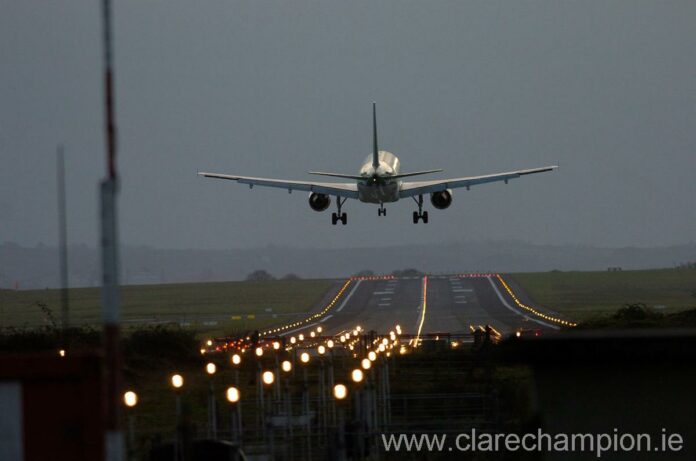Safety being compromised, controllers allege, in letter to the Minister for Transport
SHANNON and Cork airports both had to close during the summer due to a lack of air traffic controllers, and safety is being compromised by forcing those same controllers to work at short notice while tired.
That’s part of the message contained in a letter which has been sent to Transport Minister Eamon Ryan by disgruntled air traffic controllers.
The IAA employs 332 people in Shannon and at Ballygirreen in Newmarket-on-Fergus, many of them air traffic controllers.
The IAA has rejected the claims included in the letter and said that any disagreements can be resolved using existing dispute resolution processes.
The letter included stinging criticism of the IAA management, and said that Shannon and Cork Airports both closed during the summer due to staff shortages, which it claimed were brought about because of long term abuse of staff.
“As you are aware on a number of occasions an air traffic control service was not available at State airports due to a lack of air traffic controllers. Cork Airport closed for a period on July 25 and Shannon Airport on July 26. The closure of Dublin Airport on August 6 was narrowly averted thanks to the actions of the ATC Branch committee.
“The closures and non-availability of Air Traffic Controllers (ATCOs) is as a result of years of sustained abuse of the air traffic control staff by the executive management team of the Irish Aviation Authority.
“IAA management have repeatedly and unilaterally changed the terms and conditions of employment of the staff of the IAA. They have denied staff their dignity in the workplace to the point that the continuity of the provision of air traffic control service can no longer be guaranteed.”
The letter claimed that staff were “horrified” by the dismissal of a staff member with a mental illness, and queried why a recommendation for their reinstatement had not been acted on. “Every aspect of the manner in which this ATCO has been treated warrants immediate investigation,” it claimed.
The letter claimed that vulnerable people may have been mistreated, and it expressed particular concern about the death by suicide of a former employee.
It claimed that “this person may have made a protected disclosure to the Department of Transport before leaving the IAA on an unusual early retirement”.
It called on the Minister to commence an investigation into mistreatment of staff “as would be the case if similar issues were to occur within your own department”.
The letter stated that the “current conduct of the IAA executive management team has greatly impacted safety”.
It also said that the IAA is not meeting its own standards.
“(There have been ) numerous recent incidents where air traffic controllers are having their rostered duties changed on extremely short notice to cover staff shortages, effectively forcing ATCOs into working positions under protest and duress without any regard for the fatigue such changes cause. In such circumstances the IAA are not compliant with their own procedures.”
An investigation into this practice was also sought, while it claimed that “pressurising safety-critical employees to attend for duty under protest and duress without due regard for fatigue or fatigue caused by inappropriate management of the human circadian rhythm will result in increased risk of an air traffic incident or accident. This issue is specifically encompassed in the requirements of EU Regulation 373/2017.”
It stated while the IAA is reliant on overtime, which, in turn relies on goodwill from air traffic conrollers, it had alienated them.
“IAA management inexplicably failed to realise that they had created a business model that requires the co-operation of the air traffic controllers, while at the same time destroying the goodwill afforded to them by the very employees whose co-operation maintains the service continuity.”
The letter also raised concerns about pension issues and it called for a clean out of management.
“We need a management team who is not going to repeat the mistakes of the current team but someone that will have the confidence of the staff, the airlines, the Irish State and the citizens of the Irish Republic.”
In a statement on its website, the IAA refuted the allegations.
“The Irish Aviation Authority (IAA) is aware of a letter, sent to public representatives by a number of air traffic control officers relating to industrial relations matters between the company and its recognised staff representative bodies.
“As such, the IAA has provided an update to the Minister for Transport outlining the factual position on the matters raised and refuting the allegations in their entirety.”
It said it has “a long established industrial relations framework” which staff and their representatives should re-engage with to resolve issues.
The IAA also defended its record on safety.
“The priority of the IAA and all its staff is safety. This is recognised by international observers who regard the IAA as one of the top air navigation service providers globally and a consistently high performer with regard to compliance with safety standards. We never compromise on this commitment to safety.
“The past 18 months has seen unprecedented damage to the Irish aviation sector as a result of the Covid-19 pandemic.
“The IAA has been losing €375,000 per day during COVID-19. However, our commitment has been safety of Irish airspace and safety of our staff. We have kept the skies open and safe.”
It claimed it had cut pay for some staff and that there had been unofficial action by staff, which was damaging.
“We instituted a cost containment programme which resulted in no-one losing their jobs (unlike many others in the aviation sector) with a maximum 10% temporary pay reduction (no pay reduction for a number of staff).
“This unofficial action by a small number of staff does not help the aviation sector and they are urged to use the proper industrial relations channels to have the issues dealt with.
“The IAA is committed to working with our staff, trade unions and the industry to bring Irish aviation back to its best and to start the recovery.”
Owen Ryan has been a journalist with the Clare Champion since 2007, having previously worked with a number of other publications in Limerick, Cork and Galway. His first book will be published in December 2024.



